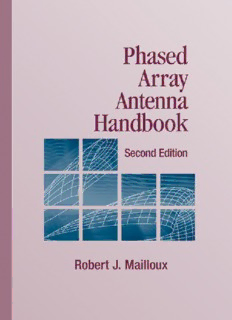
Phased Array Antenna Handbook - iut.ac.ir PDF
Preview Phased Array Antenna Handbook - iut.ac.ir
Phased Array Antenna Handbook Second Edition For a listing of recent titles in the Artech House Antennas and Propagation Library, turn to the back of this book. Phased Array Antenna Handbook Second Edition Robert J. Mailloux Library of Congress Cataloging-in-Publication Data Mailloux, Robert J. Phased array antenna handbook / Robert J. Mailloux.—2nd ed. p. cm.—(Artech House antennas and propagation library) Includes bibliographical references and index. ISBN 1-58053-689-1 (alk. paper) 1. Phased array antennas. I. Title. II. Series. TK6590.A6M35 2005 621.382’4—dc22 2005041996 British Library Cataloguing in Publication Data Mailloux, Robert J. Phased array antenna handbook.—2nd ed.—(Artech House antennas and propagation library) 1. Phased array antennas I. Title 621.3’824 ISBN 1-58053-689-1 Cover design by Leslie Genser (cid:211) 2005 ARTECH HOUSE, INC. 685 Canton Street Norwood, MA 02062 All rights reserved. Printed and bound in the United States of America. No part of this bookmaybereproducedorutilizedinanyformorbyanymeans,electronicormechanical, including photocopying, recording, or by any information storage and retrieval system, without permission in writing from the publisher. All terms mentioned in this book that are known to be trademarks or service marks have been appropriately capitalized. Artech House cannot attest to the accuracy of this information.Useofaterminthisbookshouldnotberegardedasaffectingthevalidityof any trademark or service mark. International Standard Book Number: 1-58053-689-1 10 9 8 7 6 5 4 3 2 1 To my love Marlene, and to my daughters Patrice, Julie, and Denise, each uniquely different, but each wonderful. I so love you all. Contents Preface to the Second Edition xi Preface to the First Edition xiii Acknowledgments xv CHAPTER 1 Phased Arrays in Radar and Communication Systems 1 1.1 Introduction 1 1.1.1 System Requirements for Radar and Communication Antennas 1 1.2 Array Characterization for Radar and Communication Systems 12 1.2.1 Fundamental Results from Array Theory 12 1.2.2 Array Size Determination 34 1.2.3 Time-Delay Compensation 43 1.3 Array Architecture and Control Technology 44 1.3.1 Array Aperture 44 1.3.2 Feed Architectures 47 1.3.3 Beamforming Modalities and Relevant Architectures 53 1.3.4 RF Components for Array Control 55 References 59 CHAPTER 2 Pattern Characteristics of Linear and Planar Arrays 63 2.1 Array Analysis 63 2.1.1 The Radiation Integrals 63 2.1.2 Element Pattern Effects, Mutual Coupling, Gain Computed from Element Patterns 68 2.2 Characteristics of Linear and Planar Arrays 75 2.2.1 Linear Array Characteristics 75 2.2.2 Planar Array Characteristics 84 2.3 Scanning to Endfire 89 2.4 Thinned Arrays 92 2.4.1 Average Patterns of Density-Tapered Arrays 93 2.4.2 Probabilistic Studies of Thinned Arrays 96 2.4.3 Thinned Arrays with Quantized Amplitude Distributions 99 References 107 vii viii Contents CHAPTER 3 Pattern Synthesis for Linear and Planar Arrays 109 3.1 Linear Arrays and Planar Arrays with Separable Distributions 109 3.1.1 Fourier Transform Method 109 3.1.2 Schelkunov’s (Schelkunoff’s) Form 111 3.1.3 Woodward Synthesis 113 3.1.4 Dolph-Chebyshev Synthesis 116 3.1.5 Taylor Line Source Synthesis 121 3.1.6 Modified sin pz/pz Patterns 128 3.1.7 Bayliss Line Source Difference Patterns 130 3.1.8 Synthesis Methods Based on Taylor Patterns: Elliott’s Modified Taylor Patterns and the Iterative Method of Elliott 133 3.1.9 Discretization of Continuous Aperture Illuminations by Root Matching and Iteration 139 3.1.10Synthesis of Patterns with Complex Roots and Power Pattern Synthesis 141 3.2 Circular Planar Arrays 153 3.2.1 Taylor Circular Array Synthesis 153 3.2.2 Bayliss Difference Patterns for Circular Arrays 155 3.3 Methods of Pattern Optimization/Adaptive Arrays 157 3.3.1 Pattern Optimization 157 3.3.2 Adaptive Arrays 159 3.3.3 Generalized S/N Optimization for Sidelobe Cancelers, Phased and Multiple-Beam Arrays 162 3.3.4 Operation as Sidelobe Canceler 165 3.3.5 Fully Adaptive Phased or Multiple-Beam Arrays 168 3.3.6 Wideband Adaptive Control 170 3.4 Generalized Patterns Using Covariance Matrix Inversion 175 3.5 Pattern Synthesis Using Measured Element Patterns 176 References 180 CHAPTER 4 Patterns of Nonplanar Arrays 185 4.1 Introduction 185 4.1.1 Methods of Analysis for General Conformal Arrays 186 4.2 Patterns of Circular and Cylindrical Arrays 187 4.2.1 Phase Mode Excitation of Circular Arrays 190 4.2.2 Patterns and Elevation Scan 194 4.2.3 Circular and Cylindrical Arrays of Directional Elements 194 4.2.4 Sector Arrays on Conducting Cylinders 197 4.3 Spherical and Hemispherical Arrays 220 4.4 Truncated Conical Arrays 221 References 221 Contents ix CHAPTER 5 Elements for Phased Arrays 225 5.1 Array Elements 225 5.2 Polarization Characteristics of Infinitesimal Elements in Free Space 225 5.3 Electric Current (Wire) Antenna Elements 227 5.3.1 Effective Radius of Wire Structures with Noncircular Cross Section 228 5.3.2 The Dipole and the Monopole 228 5.3.3 Special Feeds for Dipoles and Monopoles 234 5.3.4 Dipoles Fed Off-Center 238 5.3.5 The Sleeve Dipole and Monopole 238 5.3.6 The Bowtie and Other Wideband Dipoles 241 5.3.7 The Folded Dipole 241 5.3.8 Microstrip Dipoles 246 5.3.9 Other Wire Antenna Structures 247 5.3.10Broadband Flared-Notch, Vivaldi, and Cavity-Backed Antennas 248 5.4 Aperture Antenna Elements 251 5.4.1 Slot Elements 252 5.4.2 Waveguide Radiators 254 5.4.3 Ridged Waveguide Elements 256 5.4.4 Horn Elements 257 5.5 Microstrip Patch Elements 258 5.5.1 Microstrip Patch 258 5.5.2 The Balanced Fed Radiator of Collings 268 5.6 Elements for Alternative Transmission Lines 269 5.7 Elements and Row (Column) Arrays for One-Dimensional Scan 269 5.7.1 Waveguide Slot Array Line Source Elements 272 5.7.2 Printed Circuit Series-Fed Arrays 275 5.8 Elements and Polarizers for Polarization Diversity 277 References 282 CHAPTER 6 Summary of Element Pattern and Mutual Impedance Effects 291 6.1 Mutual Impedance Effects 291 6.2 Integral Equation Formulation for Radiation and Coupling in Finite and Infinite Arrays 293 6.2.1 Formulation and Results for Finite Arrays 293 6.2.2 Formulation and Results for Infinite Arrays 297 6.3 Array Blindness and Surface Waves 306 6.4 Impedance and Element Patterns in Well-Behaved Infinite Scanning Arrays 319 6.5 Semi-Infinite and Finite Arrays 327 6.6 Impedance Matching for Wide Angle and Wideband Radiation 329 6.6.1 Reduced Element Spacing 331 6.6.2 Dielectric WAIM Sheets 333 6.7 Mutual Coupling Phenomena for Nonplanar Surfaces 335
Description: